“Do you see this, this, this and that?”. The woman asks pointing approximately at a black humidity spot on the wall, a withered wooden window and a portion of lifted floor. “Well, I would love to fix it because, no matter what the owner says, this is our home: we are the ones who take care of it, and we want to stay because this is our neighbourhood, where people know me and will help me if I need it”.
Mimi Oset, 45 years old, born and raised in the Sants neighbourhood of Barcelona, has genuine concerns about her health. Because of her serious view and knees problem, which officially recognises her an 87% disability record, she often stumbles and falls. That is why her creamy Labrador carer, Boira, never moves too far away from her, and also why she gets really nervous if someone interferes between Mimi and her, as it happens more than once during our interview, which takes place in a humid and rainy Friday afternoon of the beginning of September 2021.
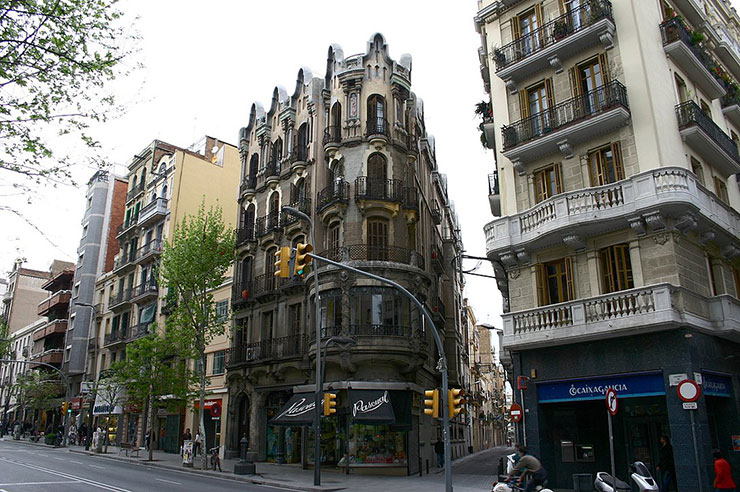
Mimi’s two daughters, the mother explains, 9 years old Ingrid and 23 years old Marina also count on an official disability record: 42% for attention-deficit/hyperactivity disorder, (ADHD), learning disorder and hearing problem in the case of Ingrid, and 36% for sight problems in the case of Marina. Because of Mimi’s health problems she cannot work; her husband, Oriol, works has a carpenter and brings home about 600 euros a month, which together with Mimi’s 356 euros’ pension are all of the family’s monthly income.
Mimi’s family is attended by the social services and is awaiting for her place in the emergency housing, a system in which Barcelona’s city council and Catalonia’s regional government (Generalitat) work together. At present, there are 600 cases in the cue.
Meanwhile, Mimi, Oriol, Ingrid and Marina expect the fourth eviction release from the three floors squatted home they have been living in for the past two years. Precisely since Oriol started suffering from depression and lost his job while Mimi and he saw their household’s rent getting higher and higher, going from 900 euros a month in 2014 up to 1.400 in 2019. That is when they decided to occupy the big house next door which had been empty for years, since the old owner had died.
The new landlord, a limited company whose joint administrator also administrates other companies dedicated to the real estate business, asked the judge to evict Mimi’s family. And he ruled in favour despite a moratorium on eviction –established as part of the urgent measures on rental contracts and evictions designed by the Spanish government to protect families such as Mimi’s in the context of the pandemic– is still in place (at least until October 31).

Yes we can, but not alone
Mimi’s case is the top of the iceberg of what experts define as a major housing crisis. “We have been talking about housing emergency for more than ten years: it is obvious that we are in a deep crisis and we don’t have the resources to cope because in Spain access to housing has been mainly driven by the market, so we lack public housing policies”, explains Guillem Domingo Utset, housing and city department of the DESC Observatory, a Barcelona based platform of human rights entities.
“In contexts with many people and interests at stake, such as Barcelona and its metropolitan area, the magnitude of the consequences of the crisis increases greatly and it makes it very difficult to give answers. It is a tsunami”. Antonio López Gay, Professor at the geography department of the UAB University and expert on housing demography confirms: “Studies are showing people in Barcelona are experiencing a high residential insecurity”.
Barcelona’s city council knows it too well. Advocating for people’s right to housing in the context of mortgage payments in the aftermath of the 2008 crisis and the Spanish real-estate bubble is how Ada Colau became well-known in Barcelona, until becoming its first female mayor back in 2015. So when Guanyem Barcelona, the citizens platform she led, first came into the office (now it is a political party named Barcelona en Comú), many people expected it could bring a significant change in housing policies.

“Its initial speech was very voluntaristic, ‘Yes, we can’, but policies need to be applied in their context and Barcelona faces a great real estate pressure, which in part has to do with tourism, but also with the polarisation of the labor market”, points out Albert Recio, Professor of the Department of Applied Economics of the UAB University and vice-president of the FAVB, the Barcelona Neighbours Federation of Associations. “On the one hand, there are people with money who work for example in the technological sectors and find it attractive to live here; on the other, low-wage temporary workers (hospitality, commerce, care work sector – where undocumented semi-slave women are taking care of the elderly) who have run out of income with the pandemic”.
Carme Arcarazo, economist and political scientist expert in urban studies and spokesperson of the Barcelona Tenants Union (Sindicat de Llogateres) adds: “It is true that the Colau administration has been more ambitious than any other before, but the competences of a municipality are limited; it is the Generalitat (regional government) the one who has competence in housing, and they are doing little to nothing. Therefore it is unreal to sell, as the city council has done, that the paradigm would change once they were in the office”.

Opaque rentals
Traditionally, housing policies in Spain have been mainly focused on promoting ownership. The fall in house prices after the 2008 crisis, together with the inability of part of the population to buy, due to tightening credit conditions, created a favourable scenario to turn rental housing into a profitable sector; many banks were in debt, then specific mechanisms (for example real estate investment trust, Socimi in Spanish) were created so that investment funds could buy homes and take them, with tax incentives, to the rental market.
A market regarding which is extremely difficult to be precise about. “Given that public housing policies are not a priority in Spain, it is logical that we have an opaque market: we do not know how many houses there are in Barcelona, we do not have a clear register of social rental housing, etc.”, explains Jordi Bosch, expert in housing policies and technical director of the Observatori Metropolità de l’Habitatge de Barcelona (the Barcelona Metropolitan Housing Observatory, a supra-municipal body depending on the City Council, Generalitat, Metropolitan Area and Diputació de Barcelona).

Bosch, who grants this interview as an expert, and not as director of the Observatory, continues: “Information on price evolution, for example, does come out, and periodically, because it heats up the market; on the other hand, having a minimum statistic on foreclosures has cost a lot and the one we have is very limited (e.g. it does not include the sociological profile of the households that suffer from them): misinformation is another reflection of the fact that economic law prevails over social law”.
The few reliable data available speak by themselves on the impact of the market in people’s lives: according to the National Institute of Statistics, in the last five years rental prices in Barcelona have risen 30 times more than wages. Moreover, based on the 2017 Encuesta Sociodemogràfica de Barcelona, 38,2% of Barcelona households live in a rental unite but the great majority (approximately 97%) rent in the private market. Social rental housing in Barcelona only represents approximately 1.4% of the total residential stock. At the Spanish level it accounts between 1 and 2%.
To compare with, in Italy it accounts for about 4%, in France 17% and in the Netherlands it reaches 30% of the total stock. Data from the OECD also show a high housing cost overburden: 76% of low-income households living in the private rental sector in Spain spend 40% or more of their disposable income on housing costs. “It is not that vulnerable people cannot afford to rent, but rather that renting makes people vulnerable”, Arcarazo points out.

A hostel room
Data also shows how the increase in housing price goes hand in hand with expulsions: according to data provided by the General Council of the Judiciary (CGPJ), more than 80% of evictions in Barcelona between 2014 and 2019 were caused by non-payment of rent. This is the case of Olga Saguer, 53 years old single mother of a 19 years old boy with Asperger. Just like Mimi and hers, Olga is awaiting her fourth eviction release, which is expected to take place at the end of September 2021.
“A few days before the pandemic hit, I lost my job at an ice-cream parlour”, Olga recalls sitting in a white sofa of the dark flat covered in boxes her son and she live in in the upper quarter of Sant Gervasi. “I had no other income: I got depressed, I was afraid of ending up in an ATM, I had a very bad time and I did not find help anywhere: institutions fail and social services do not give you a decent nor a real solution. Since I discovered my neighbourhood housing group and the housing unions I feel better, because I know they won’t let me down. I don’t know what I would have done If I hadn’t found them”.
The indecent and unreal solutions she refers to is a room hostel the city council offered temporarily to both Olga and Mimi in case of eviction. “How can they ask us to live all in one room for months, besides with the health problems our families have?”, they both commented before refusing the offer and preferred to face an eviction instead.
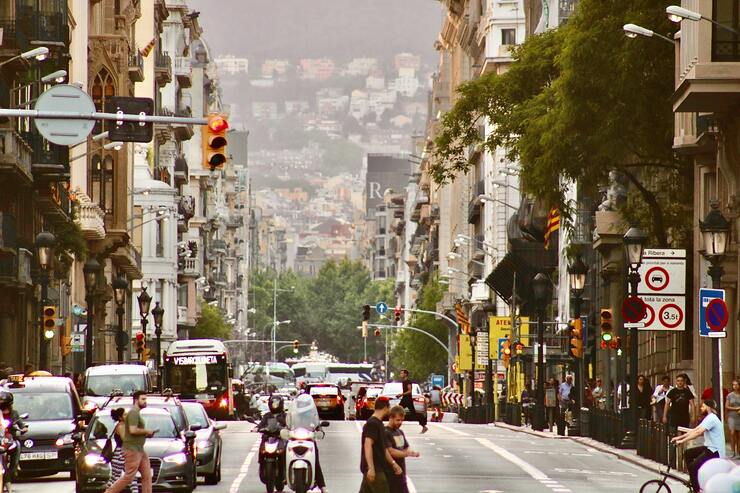
A law is needed
Olga’s nervousness increases as days come closer to her next expected eviction. Her fears for the future are backed by a recent study called “Gender Perspective Report on the right to housing and energy poverty in Barcelona” according to which in Catalonia, one in three women in a single-parent household like her is at risk of poverty. According to data from the Arrels foundation, the number of people living on the streets in the city has increased by 77% between 2010 and 2020.
The neighbourhood housing group and the housing unions she calls her family are both part of a diverse but coordinated Barcelona housing movement, organised at neighbourhood, city and regional level to accompany people in exercising the right to housing (from providing legal advice up to lead negotiations with the landlords).

A right theoretically granted by Spanish Constitution, which in its article 47 states: “All Spaniards have the right to enjoy a decent and adequate home. The public authorities will promote the necessary conditions and establish the pertinent norms to make this right effective, regulating the use of the land in accordance with the general interest so to prevent speculation. The community will participate in the capital gains generated by the urban action of public entities”. Carme Arcarazo points out: “Although the Constitution is quite clear about it, in the day to day we face constant extortion”. The organisation she is spokesperson of, the Barcelona Tenants Union, was one of the promoters in Catalonia of the first regulation of rental prices in Spain, Law 11/2020. The right-wing Popular Party appealed the norm and the Constitutional Court has admitted the appeal, which is now awaiting resolution.
Meanwhile the norm was automatically implemented for a year in 61 Catalan town and cities; for the price regulation to be active after that for five more years, local administrations need to declare the city or town “area with a tense housing market” and put a limit to the rental prices increase. Something Barcelona city council already did during an extraordinary plenary session which took place the 15th of September 2021, when they also established a five percent reduction in the maximum rental price possible. Besides the Barcelona Tenants Union, another organisation promoting the rental prices regulation was PAH (Plataforma de Afectadas for la Hipoteca), the platform mayor Ada Colau was one of the founders of.
Another organisation promoting the rental prices regulation in Catalunya was PAH (Plataforma de Afectadas for la Hipoteca), the platform mayor Ada Colau was one of the founders of. Lucía Delgado, one of its spokesperson, has it clear what the next step would have to be: “We need a social housing park in the city: if instead of being evicted families could be rehoused as it happens in many other European cities, and if we had more rights-based laws, then people would not be evicted”.
Carme Arcarazo sounds a bit more pessimistic when she states: “No matter how many decrees, even at state level, come out, in this country the judiciary will always end up making the least guaranteed decisions and protecting private property, as the moratorium on evictions is showing”. She believes that so far the main response to the housing crisis has come from the movement “which has transformed what used to be seen as an individual struggle into a subject of collective action”. In her opinion, what is needed next, besides price regulation, is for rents to be automatically renewed “and that housing unions can have union rights like those of the labor unions (e.g. right to strike)”.
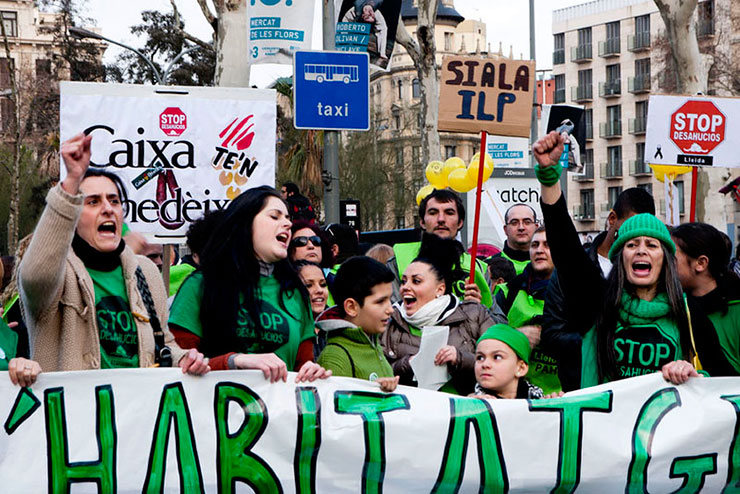
Keep out!
One of the first actions the Colau administration has undertaken has been supporting families, like those of Mimi and Olga, in risk of being evicted; in 2016 it created an anti-eviction unit to accompany, mediate and find solutions for them. The SIPHO team (Intervention service in situations of loss of housing and or occupations, the formal name of the anti-eviction unit) was there in the morning of July 27, 2021, when about one hundred people called by the Barcelona Tenants Union gathered to stop with their presence Mimi’s third eviction release. “There are kids in the street and no one cares”, “House is a right and not a privilege” could be read in posters filling Mimi’s front door while the Tenants Union, the Sants Neighbourhood Housing group and the city council SIPHO’s team negotiated with the people sent by the judge to execute the eviction.
The family’s vulnerability reports written by social services were taken out, the moratorium in place remembered, all cards were played so that Mimi’s eviction would not take place. This strategy of stopping eviction was first carried out by PAH and is now being replicated also by the rest of the housing movement. “The same SIPHO is somehow a PAH transformed into a public mechanism: the city council must have asked itself: how does the social movement stop evictions? Then let us do something like that”, Guillem Domingo Utset states.“Stopping an eviction is fine at that moment but it is postponing the problem because there is no public housing stock. Let us see what will happen when the moratorium ends. There is a queue of judicial decisions and no housing alternatives ”, warns Jaume Artigues, architect and member of the housing commission at FAVB, the Barcelona Neighbours Federation of Associations.
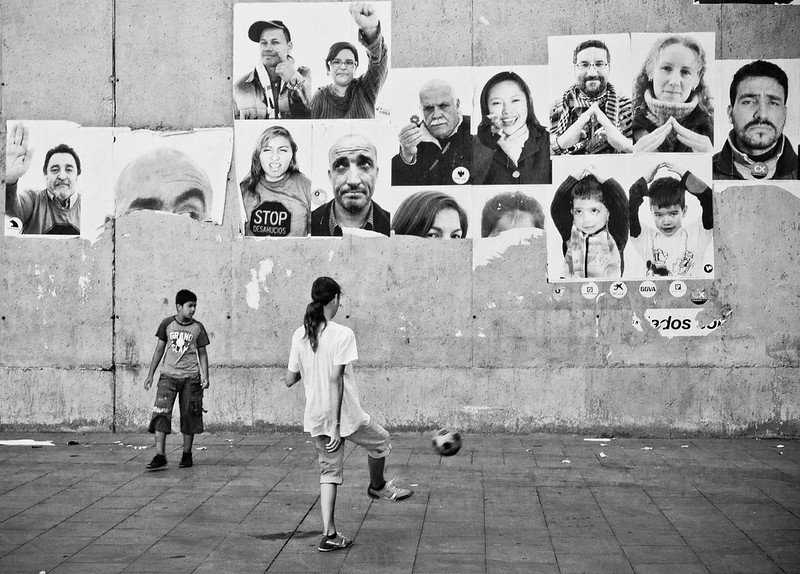
Solutions by halves
“Our goal is to be happy living together. We want to live in a community [..] so to return to the values of solidarity, mutual support and trust. Beyond having common spaces, we want to have shared interests and learn from each other. We want to build a life together, to be neighbours”. These words can be read in the “declaration of intent” of La Balma, a new housing cooperative in the Poble Nou neighbourhood.
The twenty social housing homes it comprises of have been built in a public plot that the city council has transferred through the Municipal Housing Institute of Barcelona (IMHAB) to a cooperative called Sostre Cívic for 75 years, extendable. This model, which is growing in the city, is based on collective ownership (neither public nor private) and on the “right of use” (neither purchase nor rent). The approximately 45 inhabitants started to move there during the summer of 2021. The first thing to be seen when accessing its white building of red shutters, right after crossing a public children’s playground, is what will become the community’s garden and bike parking, the common kitchen and the children’s play. “Cohabitation is the most important thing a project like this can offer”, reaffirms one of its inhabitants, architect Jordi Marfà Vives. According to Roser Casanovas, architect of the feminist urbanism cooperative Col.lectiu Punt 6, sharing implies a breach between public and private which allows new dynamics to happen: “Generating spaces for sharing and meeting, if there is awareness, facilitates the creation of spaces for co-responsibility in terms of care, power, and use”.
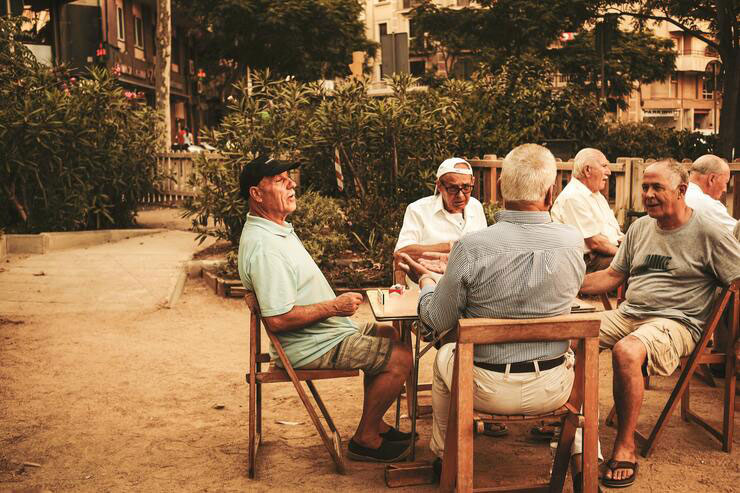
Housing cooperatives and the other mentioned initiatives promoted or supported by the city council are welcomed by most of the sources consulted for this report. The same as a measure, pioneer in Spain, which establishes that all new big construction or refurbishment in Barcelona needs to allocate 30% of it to social housing. “What the Colau’s administration has implemented represent the beginning of an advanced public policy in terms of promoting the right to housing, both in terms of implication in generating an agenda of need for change and of promoting and supporting legislative changes and specific policies”, Guillem Domingo Utset highlights. “The problem is that it takes time to see a real change and it will be impossible unless also the regional and national governments act in the same direction”.
Along the same lines intervenes Lucia Martín González, Housing Councillor of Barcelona’s local government.“We are the administration with the least competence and the least budget and the one that is by far deploying the biggest range of rights-based housing policies”. Although consulted sources agree, there is also some criticism toward the administration. “In general, the city council responds defensively to our proposals”, says Jaume Artigues of the Barcelona Neighbours Federation of Associations. For her part, Lucía Delgado of the PAH points out: “The city council party is in the state executive and we believe that it should have a much more vindictive role within the government”.
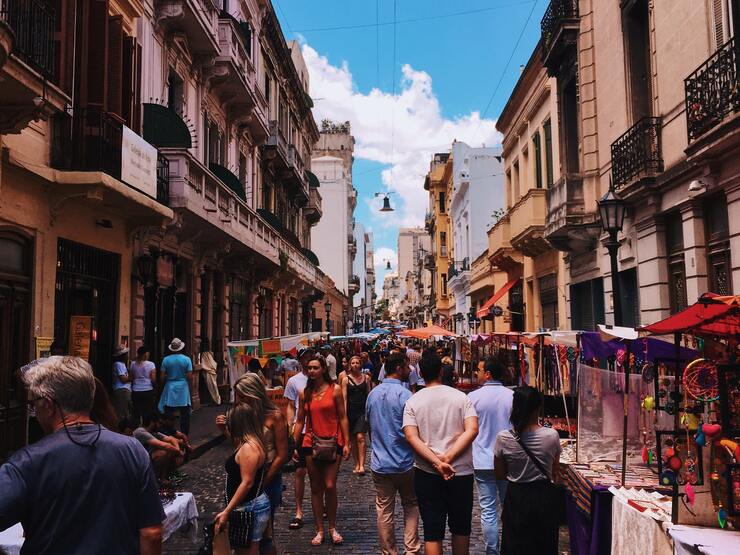
More houses
One thing all sources consulted agree on is that the Generalitat should play a bigger role in ensuring the right to house than it has so far: “Basically they should be buying a lot more public housing than they are”, summarises Jordi González Guzmán, researcher in political economy in the real estate market and in social movements defending the right to housing.
Numbers seem to support these points of view: From 2015 to 2019 the city council built and completed 762 social houses through the municipal institute IMHAB while the Generalitat through its regional INCASOL institute only 137. Asked about these figures Carles Sala i Roca, Housing and Social Inclusion Secretary of the Generalitat replies he does not know the exact numbers but he disagrees with the overall criticism toward the Generalitat implication in these matters: “We provide with a very important package of social programs for emergency care that cannot found equivalent in the entire state”.
Among others he mentions a recent allocation of 20 million euros to support social rental housing. Anyway, he admits that more funding would be needed, and ensures the Generalitat plans to increase its budget to meet the goals planned for this term: “I would like to put an end to the emergency situation, which continues to be our priority, and rebalance policies so to provide access to affordable housing not only to the most vulnerable ones, but also to other groups that have some difficulty in accessing housing, such as young people or the elderly. We need more resources from the state and the Generalitat also has to make a budgetary effort in public housing policies: throughout this term we expect multiplying per four our budget”.
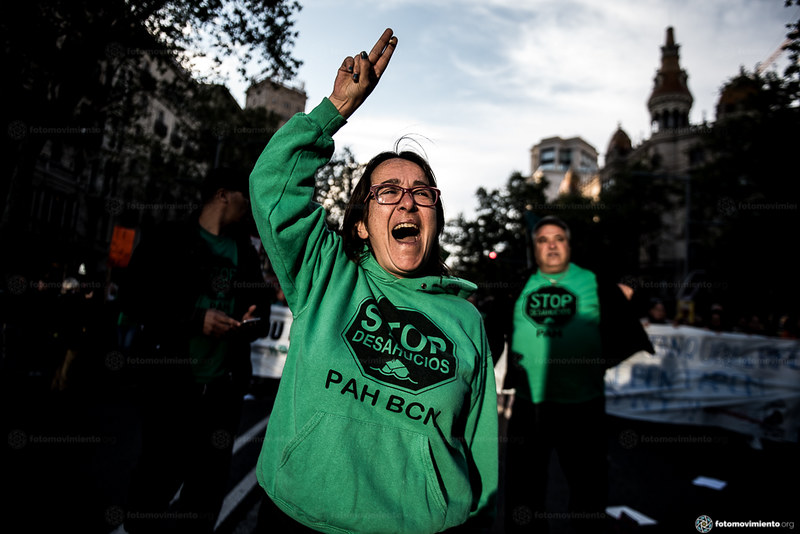
Freedom
Mimi does not know about the public administration’s budget; all she knows is she wants to stay where she lives. And she has a proposal for the public administrations: “They could use the money they would spend for the pension they propose to pay us a rent in the neighbourhood instead, or they could talk to the owner and reach an agreement for him to rent us, hopefully with a right to buy… They need to do whatever it takes so that I can stay here with the assurance that neither I nor my daughters will be expelled”.
The interview is over and Mimi and I stand in her front door about to say goodbye. She looks tired and dreamy while she leans against the hazelnut wooden door and recalls: “In the summer hottest nights the neighbours and I bring our chairs out here and we chat, like in a town. Do you know where we leave our cellphones?”, she asks rhetorically. “Here”, she adds touching with a finger the door’s handlebars and smiling. “And when I come back from doing my chemotherapy and I am too tired to go to the park with my daughter Ingrid, the neighbours take care of her so that I can rest. Do you know what that means to me? Freedom”.
At the end of this investigative report, Olga Saguer and her son were evicted from the place they had lived in for years. Seven police vans and almost thirty mossos d’esquadra (Catalan police) in riot gear arrived at about 10.30 am on 17 September to send away the forty people who peacefully, sitting on the ground, tried to block the entrance to Olga’s door. The last scene that the journalist, author of this story, was able to see were two policemen who lifted a boy of about twenty years old, who was not resisting, from the ground while a megaphone warned of administrative and criminal sanctions for those who decided not to leave voluntarily. Only one mother with her teenage son got up. The others remained seated. Then the reporters were forced to leave the police line, outside of which it was no longer possible to see anything.
On October 5, 2021 the two parties within the Executive, PSOE and Unidas Podemos announced they reached an agreement on the first Spanish national Housing Law. The agreement was sealed after almost one year of negotiation and the explicit opposition of the real estate sector. The law expected to be approved by the cabinet council in the next few weeks following the announcement, among others will include a rental price regulation –although only big landlords will be obliged to lower prices so as to not exceed the maximum price established by the price index– and tax surcharge for empty homes. On the other side at the end of September more than 150 civil society organisations, together with nine political parties (including Unidas Podemos) also registered an alternative law proposal at the Spanish Congress.





